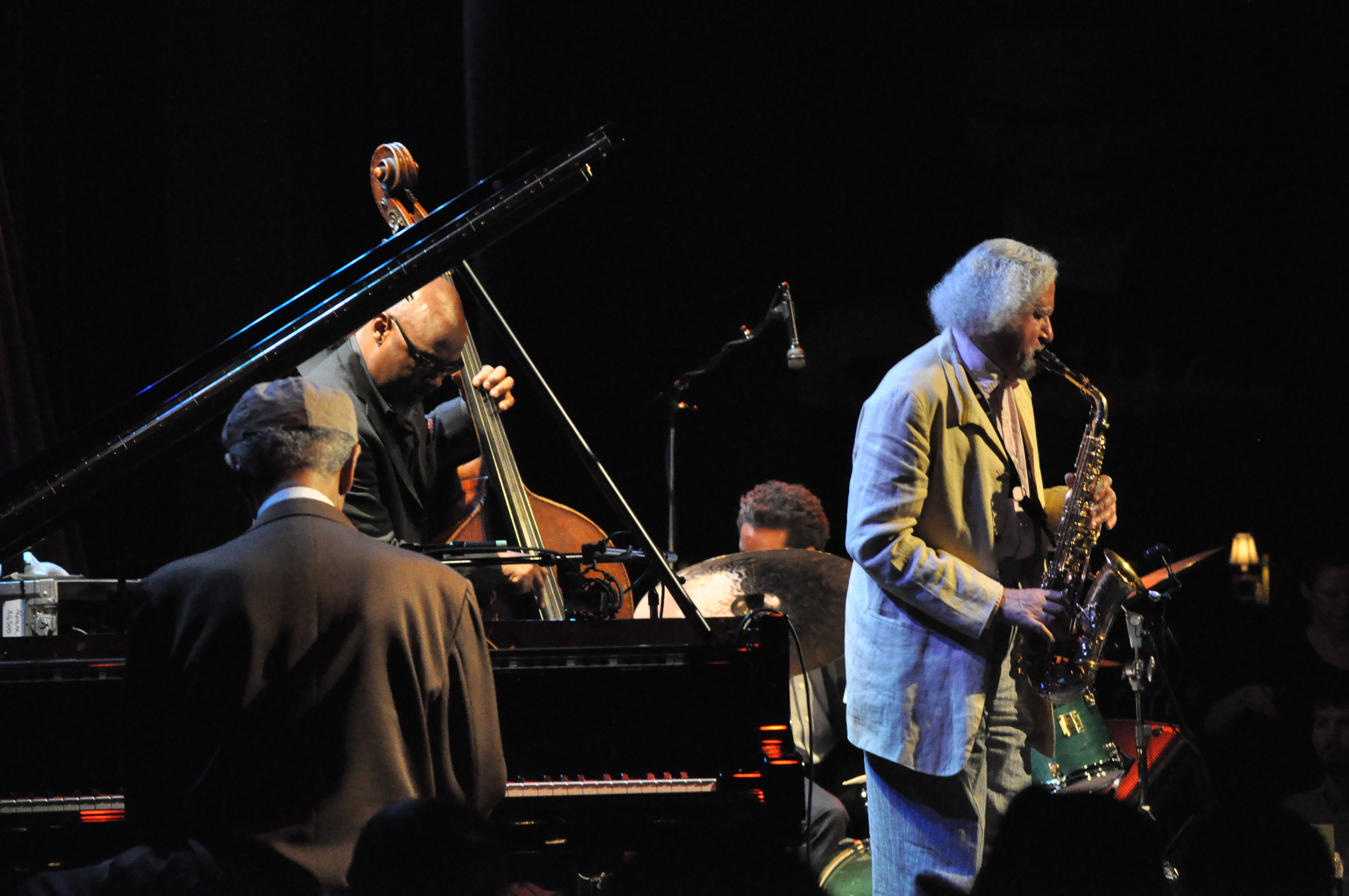 |
| Photograph: Dani Alvarez Cañellas |
Like Paul Motian, he was a drummer who became a genre. As Motian did, he established himself as a sideman to heavy players, but it was only when his pen and his bandleading instincts came into play that he truly found himself. There's clearly a thread running from Ornette Coleman's Prime Time to the Decoding Society, the band Ronald Shannon Jackson led in one form or another from 1979 up until his death yesterday at the age of 73: the sour harmonies, the ragged rubato theme statements, the sense of funk being regarded in a funhouse mirror.
But Jackson took this concept far further than Ornette ever did. I'm listening to the title track of 1981's Street Priest right now, and its weirdness is intoxicating. This is a dance band from Mars. Jackson's patented Little Drummer Boy march pattern—rushed, tense, almost antic—giving way to a theme statement that would sound exuberant if it didn't sound like it was coming off the rails, like half the band was meandering off, each player exploring his own orbit. Electric basses thrumming, Vernon Reid unspooling merciless sci-fi shred, the saxophones not squawking in that manly free-jazz way but zipping and snaking around in the upper registers. It's cacophonous but it's also whimsical, bordering on cartoonish. (For a similar sensation, see also: the Lounge Lizards.) And it's unrepentantly of its time.
I think Shannon was looking for a new kind of hip that he couldn't find elsewhere. The results were different, much more knowingly engaged with the language of free jazz, than Miles's electric experiments. (And, it must also be said that while Miles never seemed to have much time for composition, using thematic material as a mere springboard, Shannon was a true writer, a lover of themes and arrangement, a romantic with the pen.) But there's a similar sense of a bandleader wanting to tear down the walls separating art music, popular music, folk music—to cram radical ideas into a format you could wiggle around to, to square the esoteric with the earthy. The same principle is at work in Last Exit, a band to which Shannon contributed the essential soil, the backbone of the blues.
Early last year, I went through a serious RSJ obsession, which had grown out of a specific obsession with the album Power Tools (a favorite of RSJ expert Steve Smith), a fascinating collaboration with guitarist Bill Frisell and bassist Melvin Gibbs, the latter a Decoding Society mainstay. I haven't thought about RSJ or the Decoding Society much since that time, and I think that's fitting, in a way. Again, as with Motian, Jackson is an acquired taste. As drummers, the two share a certain stubbornness of aesthetic: if Motian wanted to indulge in uncomfortable sparseness or obtuse abstraction, he'd do it; if Shannon wanted to play his borderline-cornball see-saw march-funk patterns, that was what was gonna happen. But, almost as a reward for our patience, each drummer gave us an entire world of music, only obliquely related to their formative work or various outside collaborations, a brand of sorcery that could only be experienced when Motian or Shannon, respectively, was the one in charge, exerting a not-always-traceable but ever-palpable influence. (Theirs were presences that altered the physical properties of the spaces and settings in which they played.) This parallel went right down to the fascination with multiple guitars/basses, and the wizardly use of language: "Look to the Black Wall," "Owl of Cranston," "Fantasm," "Yahllah"; "Sperm Walk," "Boiling Cabbage," "Aged Pain," "Green Coronas." There's a sense in each of wanting to levitate above the stultifying normalcy that can creep into jazz, as it becomes more and more a known quantity, to reinject some of the mystery (in Motian's case) and the vibrant lunacy (in Jackson's).
I never got to see Jackson play live. I sent a few interview requests to the e-mail provided on his website and didn't hear back. But those are selfish regrets. Ronald Shannon Jackson left an enormous body of work, enough to relish and puzzle over for many lifetimes. What I really wish is that someone would undertake a Complete Decoding Society box set; too many brilliant records under RSJ's leadership are still too hard to find. No online database will get you where you need to go, RSJ-wise, but below are a few recommendations.
"Ashes," from Red Warrior (1990):
"Gossip," from Barbeque Dog (1983):
"Time Table," from Music Revelation Ensemble's No Wave (1980):
For the record, my favorite Last Exit album is Köln, which is available on Spotify. In terms of recent RSJ, there isn't much to choose from, but Wadada Leo Smith's Tabligh is outstanding. And here's some tantalizing footage from what I believe was the last RSJ live appearance, last summer in Texas. (Some valuable context here.) Drumming-wise, he sounds as good—i.e., as much a steward of the music in its delicate entirety, not just of rhythm—as I've ever heard him:
P.S. There's some relevant RSJ talk in my Heavy Metal Be-Bop interviews with Melvin Gibbs and Gentry Densley.

